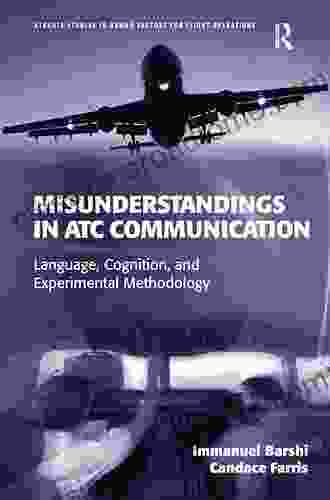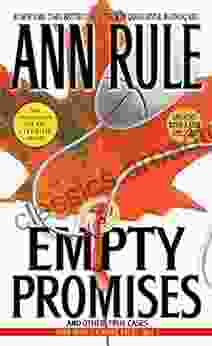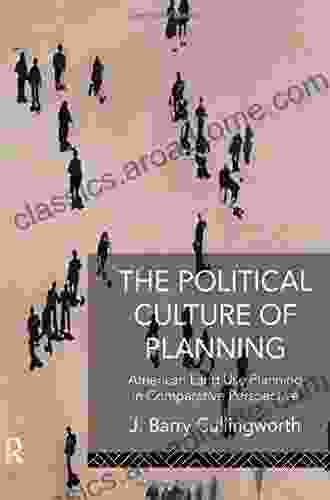The Political Culture of Planning: Unlocking the Secrets of Shaping Our Built Environment

The built environment we inhabit is not merely a collection of buildings and infrastructure; it is a reflection of our values, aspirations, and the political forces that shape our society. In his groundbreaking book, "The Political Culture of Planning," author Dr. Thomas Sander provides a comprehensive analysis of the intricate relationship between politics and planning, shedding light on the hidden factors that influence urban development.
Understanding Political Culture
At the heart of Dr. Sander's analysis is the concept of political culture, which he defines as "the shared beliefs, values, and norms that shape political behavior." These cultural factors, he argues, have a profound impact on the planning process, influencing everything from the goals we set for our communities to the specific policies and actions we take to achieve them.
5 out of 5
| Language | : | English |
| File size | : | 1426 KB |
| Text-to-Speech | : | Enabled |
| Screen Reader | : | Supported |
| Enhanced typesetting | : | Enabled |
| Word Wise | : | Enabled |
| Print length | : | 451 pages |
Dr. Sander identifies three key dimensions of political culture: individualism, egalitarianism, and hierarchism. Individualism, he explains, emphasizes the importance of personal freedom and autonomy, while egalitarianism values equality and social justice. Hierarchism, on the other hand, places emphasis on authority and tradition.
The Influence of Power
Power, Dr. Sander argues, is a central factor in understanding the political culture of planning. Those who hold power have the ability to influence the planning process and shape the built environment in accordance with their own values and interests. This can lead to conflicts between different power groups, such as developers, residents, and elected officials.
Dr. Sander analyzes the various ways in which power is exercised in the planning process, including through formal channels such as zoning regulations and environmental impact assessments, as well as through informal channels such as lobbying and community organizing.
The Role of Institutions
In addition to power and values, Dr. Sander also examines the role of institutions in shaping the political culture of planning. Institutions, he argues, provide the framework within which planning takes place and can either facilitate or hinder the achievement of planning goals.
Dr. Sander discusses the influence of different types of institutions on planning, including local governments, planning agencies, and citizen participation groups. He analyzes how these institutions interact with each other and how they contribute to the overall political culture of planning.
Case Studies and Real-World Examples
To illustrate the concepts and theories discussed in the book, Dr. Sander provides numerous case studies and real-world examples. These case studies, drawn from a variety of contexts, demonstrate the practical implications of the political culture of planning and provide valuable insights into how planning decisions are made.
One case study examines the redevelopment of a historic downtown district, highlighting the conflicts between preservationists, developers, and local residents. Another case study analyzes the siting of a new waste disposal facility, revealing the complex interplay between environmental concerns, economic interests, and community opposition.
Implications for Planning Practice
Dr. Sander concludes his book by discussing the implications of his findings for planning practice. He argues that planners must have a deep understanding of the political culture of their communities and be able to navigate the complex web of power, values, and institutions that shape the planning process.
Dr. Sander provides a number of recommendations for planners, including: actively engaging with the public, building coalitions with diverse stakeholders, and using their expertise to inform decision-making. He also emphasizes the importance of long-term planning and the need for planners to think strategically about the future of their communities.
"The Political Culture of Planning" is an essential read for anyone interested in understanding the intricate relationship between politics and planning. Dr. Sander's comprehensive analysis provides a valuable framework for thinking about the factors that shape our built environment and offers practical guidance for planners seeking to create more just and sustainable communities.
Whether you are a seasoned planner, an urban policymaker, or simply a citizen concerned about the future of your community, "The Political Culture of Planning" will provide you with a deeper understanding of the forces that shape our built environment and empower you to make a positive difference in shaping the future of our cities and towns.
5 out of 5
| Language | : | English |
| File size | : | 1426 KB |
| Text-to-Speech | : | Enabled |
| Screen Reader | : | Supported |
| Enhanced typesetting | : | Enabled |
| Word Wise | : | Enabled |
| Print length | : | 451 pages |
Do you want to contribute by writing guest posts on this blog?
Please contact us and send us a resume of previous articles that you have written.
 Book
Book Novel
Novel Page
Page Chapter
Chapter Text
Text Story
Story Genre
Genre Reader
Reader Library
Library Paperback
Paperback E-book
E-book Magazine
Magazine Newspaper
Newspaper Paragraph
Paragraph Sentence
Sentence Bookmark
Bookmark Shelf
Shelf Glossary
Glossary Bibliography
Bibliography Foreword
Foreword Preface
Preface Synopsis
Synopsis Annotation
Annotation Footnote
Footnote Manuscript
Manuscript Scroll
Scroll Codex
Codex Tome
Tome Bestseller
Bestseller Classics
Classics Library card
Library card Narrative
Narrative Biography
Biography Autobiography
Autobiography Memoir
Memoir Reference
Reference Encyclopedia
Encyclopedia Amitav Ghosh
Amitav Ghosh Scott Wynn
Scott Wynn Ani Phyo
Ani Phyo Amy Jo Kim
Amy Jo Kim Stella Branch
Stella Branch Andreas Moritz
Andreas Moritz Anirban Bandyopadhyay
Anirban Bandyopadhyay Ania Catalano
Ania Catalano Joel Scambray
Joel Scambray Andrzej Szczeklik
Andrzej Szczeklik David D Busch
David D Busch Paul Fenton Smith
Paul Fenton Smith Andy Beal
Andy Beal Chris Behrsin
Chris Behrsin Amelia Knight
Amelia Knight Massimo Ceraolo
Massimo Ceraolo Amit Batla
Amit Batla Keiko Murakumo
Keiko Murakumo Emily Grabham
Emily Grabham Ann Gomez
Ann Gomez
Light bulbAdvertise smarter! Our strategic ad space ensures maximum exposure. Reserve your spot today!

 George OrwellUnlocking a Toxin-Free Future: The Essential Guide for Every Health-Conscious...
George OrwellUnlocking a Toxin-Free Future: The Essential Guide for Every Health-Conscious... Preston SimmonsFollow ·8.9k
Preston SimmonsFollow ·8.9k Barry BryantFollow ·18.7k
Barry BryantFollow ·18.7k Thomas HardyFollow ·9.8k
Thomas HardyFollow ·9.8k Allan JamesFollow ·4.3k
Allan JamesFollow ·4.3k Samuel WardFollow ·8.8k
Samuel WardFollow ·8.8k Jorge Luis BorgesFollow ·16.3k
Jorge Luis BorgesFollow ·16.3k Chance FosterFollow ·11k
Chance FosterFollow ·11k Charles DickensFollow ·11.8k
Charles DickensFollow ·11.8k

 Braden Ward
Braden WardThe True Story of Murder and Betrayal
In a small town where...

 W. Somerset Maugham
W. Somerset MaughamUnraveling the Complexities of Human Language: A...
Language is a fundamental aspect of human...

 Ibrahim Blair
Ibrahim BlairTrue Crime Tales That Will Keep You on the Edge of Your...
Prepare to be...

 Rick Nelson
Rick NelsonPatterns In Rhyme: A Journey of Discovery with Patrick...
Welcome to the...

 Edgar Hayes
Edgar HayesWithout Pity: Unmasking the Evil Within
In the realm of true...

 Cooper Bell
Cooper BellFannie Lou Hamer's Indelible Legacy: Unraveling the...
The Black Freedom Movement, a pivotal...
5 out of 5
| Language | : | English |
| File size | : | 1426 KB |
| Text-to-Speech | : | Enabled |
| Screen Reader | : | Supported |
| Enhanced typesetting | : | Enabled |
| Word Wise | : | Enabled |
| Print length | : | 451 pages |










